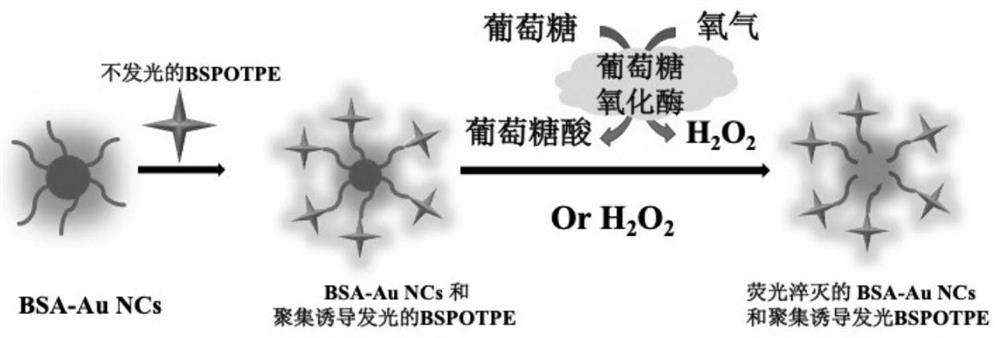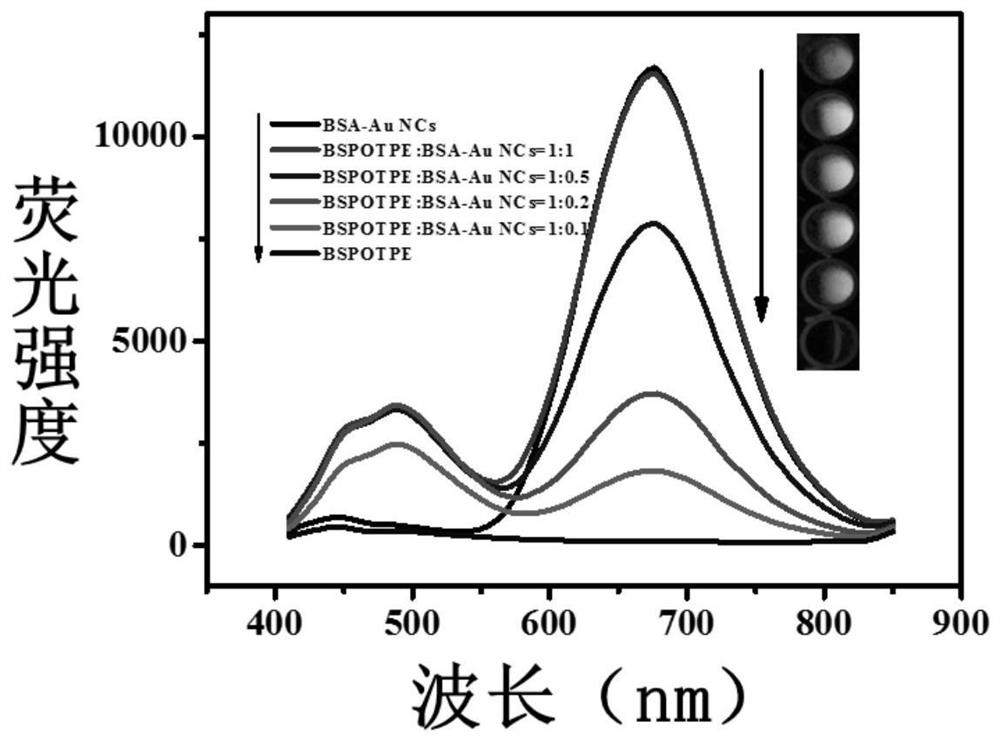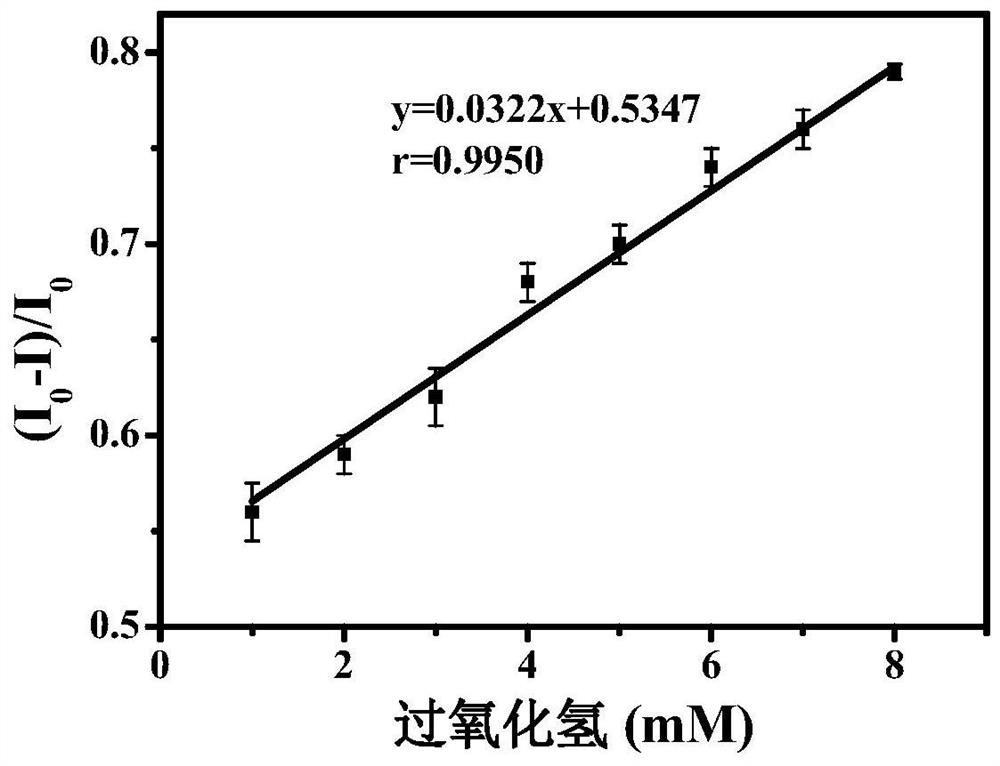A Fluorescent Ratiometric Probe Based on Aggregation-Induced Luminescent Properties and Its Application in the Detection of Hydrogen Peroxide and Glucose
A fluorescence ratio probe and aggregation-induced luminescence technology, which is applied in the intersection of chemistry and materials science, can solve the problems of easy interference and self-quenching of detection results, and achieve the effect of visual semi-quantitative detection and broad application prospects.
- Summary
- Abstract
- Description
- Claims
- Application Information
AI Technical Summary
Problems solved by technology
Method used
Image
Examples
Embodiment 1
[0035] A fluorescent ratiometric probe based on aggregation-induced luminescence properties, which is a composite material of tetraphenylethylene sulfonate and bovine serum albumin-coated gold nanoclusters. According to the different mixing ratios of the two, the color of the composite material appears red , yellow or blue;
[0036] A method for preparing a fluorescent ratio probe based on aggregation-induced luminescent properties, the specific steps are as follows:
[0037] Step 1. Prepare tetraphenylethylene sulfonate solution, weigh a certain amount of 1,2-bis[4-(3-sulfonic acid propoxy)phenyl]-1,2-stilbene sodium salt (BSPOTPE) , dissolved in water with a concentration of 0.1mg / L.
[0038] Step 2: To prepare gold nanoclusters coated with bovine serum albumin, add 5mL of chloroauric acid (10mM) to 5mL of bovine serum albumin solution (50mM), adjust the pH to 10 with sodium hydroxide, and react at 37°C for 12 Hours, bovine serum albumin-coated gold nanoclusters (BSA-Au NC...
Embodiment 2
[0041] Detection of hydrogen peroxide: take 12.5 μL of bovine serum albumin-coated gold nanoclusters (5 mM, as Au in chloroauric acid 3+ Ion concentration meter) and 25 μL of 1,2-bis[4-(3-sulfonic acid propoxy)phenyl]-1,2-stilbene sodium salt (0.1 mg / L) were mixed into a fluorescent ratiometric probe. 50 μL H 2 o 2 The solution (1, 2, 3, 4, 5, 6, 7, 8mM) was mixed with the above-mentioned fluorescent ratio probe, and 100 μL of PBS buffer (10 mM, pH 7) was added, and the volume was adjusted to 500 μL, and reacted at 37 ° C for 30 min, and then used The fluorometer scans the fluorescence emission wavelength of 410-850nm, and records the ratio of fluorescence intensity I and I 0 , I and I 0 The ratio (F 680 / F 490 ), to obtain the fluorescence ratio change value (I 0 -I) / I 0 The linear relationship between the concentration of hydrogen peroxide and C (I 0 -I) / I 0 =0.0322C+0.5347, such as image 3 shown. Using this linear relationship, hydrogen peroxide in unknown sampl...
Embodiment 3
[0043] Glucose detection: Take 12.5 μL bovine serum albumin-coated gold nanoclusters (5mM, as Au in chloroauric acid 3+ Ion concentration meter) and 25 μL of 1,2-bis[4-(3-sulfonic acid propoxy)phenyl]-1,2-stilbene sodium salt (0.1 mg / L) were mixed into a fluorescent ratiometric probe. Mix 100 μL glucose solution (1, 2, 3, 4, 5, 6, 7, 8, 9 mM) with 100 μL glucose oxidase (0.5 mg / L) solution, add 100 μL PBS buffer (10 mM, pH 7), add Add water to the fluorescence ratio probe, add water to make up to 500 μL, mix well, react at 37°C for 30 minutes, then scan the fluorescence emission wavelength of 410-850nm with a fluorometer, and record the fluorescence intensity ratio I and I 0 , I and I 0 The ratio (F 680 / F 490 ), to obtain the fluorescence ratio change value (I 0 -I) / I 0 Linear relationship with glucose concentration C (I 0 -I) / I 0 =0.0705C+0.0407, such as Figure 4 shown. Using this linear relationship, glucose in unknown samples can be quantified. Semi-quantitative...
PUM
 Login to View More
Login to View More Abstract
Description
Claims
Application Information
 Login to View More
Login to View More - R&D
- Intellectual Property
- Life Sciences
- Materials
- Tech Scout
- Unparalleled Data Quality
- Higher Quality Content
- 60% Fewer Hallucinations
Browse by: Latest US Patents, China's latest patents, Technical Efficacy Thesaurus, Application Domain, Technology Topic, Popular Technical Reports.
© 2025 PatSnap. All rights reserved.Legal|Privacy policy|Modern Slavery Act Transparency Statement|Sitemap|About US| Contact US: help@patsnap.com



